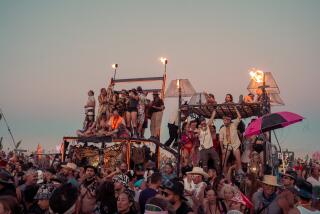EXPERT PUTS BAND IN THE RIGHT LIGHT
- Share via
SAN DIEGO — The five members of Private Domain, a local rock band, are standing around on stage at the Bacchanal nightclub in Kearny Mesa, impatiently tapping their feet.
They’ve plugged in their instruments, they’ve turned on their amplifiers and microphones, and they’re ready to play.
The crowd is lining the dance floor, waiting for the music to start. They’ve downed their drinks, they’ve chosen their partners, and they’re ready to dance.
The only one who isn’t ready is Mike Camp, the light man. He’s perched on a stool in the center of the dance floor, making a last-minute focusing adjustment to one of the lights suspended from the ceiling.
Moments later, he’s done. Walking back to his lighting console, next to the sound board across the dance floor from the stage, Camp grins and says: “There--now everything’s perfect, just perfect. The show can finally get under way.”
This kind of perfectionism is typical of artists, and in essence, Camp is an artist. His brushes are the nearly 40 colored lights that either hang from the ceiling in front of, above and behind the stage, or beam upward from the stage floor, three on each side.
His palette is the $2,300 Avolites console from which he controls those lights, their color and their aim.
His canvas is the stage itself, which he blankets with a kaleidoscopic flow of greens, reds, violets, blues, yellows, whites, oranges and pinks throughout the band’s performance.
His strokes, he said, are guided solely by what he hears.
“Basically, my job is to take the music and present it visually,” Camp said. “I try to tell the same story, and create the same mood, with my lights that the band is trying to get across with their lyrics and with their music.
“During a real dynamic part of a song, I’ll use lots of bright lights and plenty of movement; during a more subtle part, I’ll use softer lights and less movement.
“And if the band is doing something special, like a guitar solo, I’ll highlight that as well by focusing my lights on the guitarist and visually enhancing what he does.
“The idea is to grab people’s attention and get them involved with the music so that what they see complements what they hear.”
Camp, 34, has been a professional light man for eight years. Several nights each week, he mans the lighting console for Private Domain in nightclubs like the Bacchanal.
He’s also been asked to do lights for such national acts as Los Lobos, at the Belly Up Tavern in Solana Beach, and Ronnie Laws, at the Pacific Amphitheater in Orange County. Earlier this year, he spent a month on the road with the Ventures.
“Quite often, I’ll get called at the last minute by some band whose regular light man didn’t show up,” Camp said. “That’s what happened with Ronnie Laws. He asked me to do lights 10 minutes before the concert began.
“I have to admit, I was a little scared. Instead of the 38 lights at the Bacchanal, I suddenly found myself directing 250 lights--in front of 18,000 people.
“In situations like that, you simply have to do the best you can. After feeling things out during the first couple of songs, my butterflies went away and everything worked out all right.”
On the day of a show, Camp’s work generally begins around noon, when he drops by the club or concert hall for several hours to familiarize himself with the console and make any necessary adjustments.
“I always try to get the maximum effect with whatever’s available,” Camp said. “I refocus the lights and direct them to what I consider the optimum angle, so that it really doesn’t matter whether I’m working with eight lights or 80--the stage coverage will be the same.”
A few minutes before show time, Camp makes a final check. And when the band starts to play, Camp, the artist, starts to paint.
During a vocal highlight, he might beam the spotlight on the singer while silhouetting him from behind with a white floor light and two red ceiling lights.
During a guitar solo, he might silhouette the guitarist from the side with a white floor light and from behind with red and green ceiling lights.
And during a drum solo, he might illuminate the drummer with a white floor light while flashing red and yellow ceiling lights against the drum kit in time to the beat.
Originally from Virginia, Camp came to San Diego with the Navy. After his discharge, he worked days in a music store and nights as a stagehand with Private Domain (then called Bratz).
“Eight years ago, I sort of got thrown into the job of light man,” he said. “Their regular guy had quit, and they told me to just to do whatever feels good.
“Since then, I’ve learned a lot, mostly by teaching myself. It’s good to have some electrical training in your background, which I have, but, mostly, you need creative ability.
“In the end, it all comes down to what you hear--and how you respond to what you hear.”
More to Read
The biggest entertainment stories
Get our big stories about Hollywood, film, television, music, arts, culture and more right in your inbox as soon as they publish.
You may occasionally receive promotional content from the Los Angeles Times.










